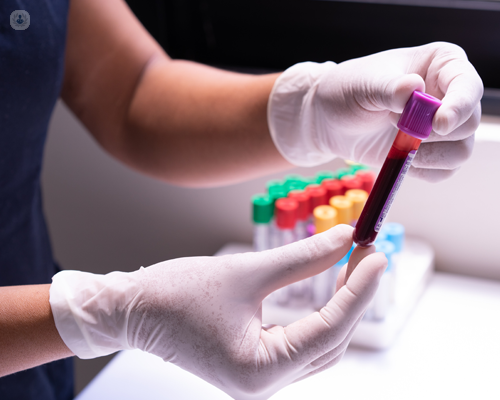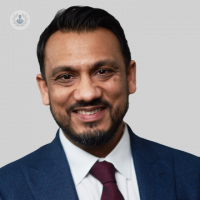All about platelet rich plasma (PRP) injections
Written in association with:Considering platelet-rich plasma (PRP) injections but unsure where to start? Leading orthopaedic knee surgeon Mr Saket Tibrewal discusses this treatment in this article, considering the benefits, risks and procedure.

What is platelet rich plasma (PRP)?
Our blood is made up of a liquid component called plasma. It also contains three main solid components:
- the red blood cells (RBCs);
- white blood cells (WBCs), and;
- platelets.
Platelets play an important role in forming blood clots and also consist of special proteins known as growth factors, which help with our body’s healing process.
PRP is a high concentration of platelets and plasma. A normal blood specimen contains only six per cent of platelets, while platelet-rich plasma contains 94 per cent of platelets and 5 to 10 times the concentration of growth factors found in normal blood. This means it has greater healing properties.
What are the indications for PRP injections?
PRP is relatively new as a method of treatment for various orthopaedic conditions. These include:
The injections can help to relieve painful symptoms, promote healing and delay joint replacement surgery.
What’s involved in the platelet rich plasma injection procedure?
First, your doctor will draw about 10 ccs of blood. This comes from the large vein in your elbow. This blood is then spun in a centrifuge machine for about 10 to 15 minutes to separate the platelets from the remaining blood components.
The injured part of your body is then anaesthetised with a local anaesthetic. Then, the platelet-rich portion of your blood is injected into the area that’s affected. In some cases, your doctor may use ultrasound guidance. This ensures proper needle placement.
What is involved in post-procedure care following PRP injections?
It’s normal to feel some discomfort in and around the injection site for a few days after your procedure.
- Cold compresses may help to relieve your symptoms.
- You’ll be instructed to stop using any anti-inflammatory medications.
- Normal activities can be resumed but you should avoid any strenuous activities like heavy lifting or exercises.
What are the risks and complications of PRP injections?
There are very minimal risks associated with PRP injections. Some of the potential ones include:
- Increased pain at the injection site;
- Infection;
- Damage to adjacent nerves or tissues;
- Scar tissue formation;
- Calcification at the injection site.
If you require expert platelet-rich plasma treatment, arrange a consultation with Mr Tibrewal via his Top Doctors profile.


